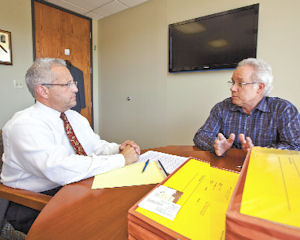Local law firms are bracing for what they expect to be the worst delays in civil court hearings in two decades as the state’s budget ax falls on the trials courts including the nation’s largest — Los Angeles Superior Court. Amid a $24.5 billion state budget deficit, state judicial administrators last month ordered an unprecedented $350 million in cuts to the state’s 58 county court systems. Los Angeles will have to cut its $512 million budget by 7.5 percent, or $38.4 million, for fiscal 2011-2012, which began July 1. L.A. court officials will meet later this month to decide how the cuts will be made. Lawyers and their clients, meanwhile, are considering settling their disputes with private mediators or taking them out of state with the hope of a quicker resolution. “Twenty years ago, it was commonplace for a matter to take five years from filing to judgment,” said David Adelman, a partner at the Encino firm Greenberg & Bass. The firm handles about 200 business and bankruptcy cases in courtrooms across the state at any given time. “Lawyers were outraged at that time. Clients were even more outraged at that time because they couldn’t get justice quick enough. We spent 20 years trying to fix it. With these budget cuts, it’s going to creep up towards five years again.” Fred Gaines, a lawyer at Gaines & Stacey, whose Encino firm is involved with 100 real estate cases across the state, said more people may take their disputes elsewhere. “The California courts will be looked at as much less reliable,” he said. “If you want your matter resolved in a more timely fashion you’re going to need to utilize some kind of dispute resolution.” Gaines said those who are entering into contracts where they choose where a dispute will be resolved will be using other states more often. “That’s always less convenient and more costly,” he said. L.A. is the state’s biggest court system with 605 courtrooms, 4,900 employees and a growing caseload that reached three million last year, nearly a third of all the cases handled across the state. Some 60 percent of all cases are for traffic infractions; 30 percent are for cases including criminal, juvenile, family law and others; and 10 percent are civil. The biggest impacts will be felt in civil cases and business disputes, judges and lawyers said. Criminal cases won’t be significantly slowed because of the U.S. Constitution’s speedy trial act laws, they added. “The civil side is going to have to bear a disproportionate amount of the cuts,” said Lee Smalley Edmon, the presiding judge for L.A.’s courts. He has formed a budget working group to recommend cuts to the court’s executive committee made up of judges from across L.A. County. Ira Handelman, the president of Handelman Consulting Inc., an Encino-based government and community relations group for the development community, called the cuts devastating. He said further delays would impinge on businesses that depend on resolutions to move forward with projects. “It’s absolutely a catastrophe,” Handelman said. “Everything in government takes too long.” A December 2009 study of the economic impacts of L.A. court cutbacks projected that 1,800 court employees could be laid off and 43 criminal and 139 civil courtrooms could close by fiscal 2012-2013 if the state’s economic problem continues. This latest grim budget picture comes on the heels of four previous years of furloughs and shuttered courtrooms. Sixteen months ago 329 employees were handed pink slips. During a budget crunch in November 2002, 29 courtrooms were closed. “The options you have are layoffs, furloughs, closure of courthouses and attrition,” Edmon said, adding that court administrators will also raid the $81 million in reserves to help defray the impacts. “In order to get by with this level of cuts, those monies are going to be spent down. We’re considering all options.” Adelman of Greenberg & Bass said he believes that with the cuts, people will lose confidence in the trial system. “You’re going to force more people into private dispute resolution,” he said. “Not that that’s a bad thing. But it undercuts some of our basic principles of our justice system — trial by a jury of your peers.” During a meeting in San Francisco last month, judges and other court officials from across the state made impassioned pleas to the Judicial Council, which supports the 58 county courts, to minimize the cuts. “We’re just judges,” said Kern Superior Court Judge David Lampe. “We’re not politicians, policymakers. We need to marshal the courage to return to our core humility, which is the simple task of presiding upon or deciding the cases for the citizens of our communities. That’s what we do. That task needs to be funded as much as possible.” Katherine Feinstein, the presiding judge of San Francisco Superior Court, called the budget shortfall a “disastrous situation” and pleaded with state court administrators to save this vital public service. The San Francisco court issued pink slips to 41 percent of its court staff and closing 25 of its courtrooms, Feinstein said. “San Francisco may be the first trial court to fall, but I know that others are soon to follow,” she said. “I know that these are terribly difficult times … but I also know that our citizens’ access to justice is fundamental and paramount … For our justice system to survive, it is your (the Judicial Council’s) solemn duty to preserve this access.”
